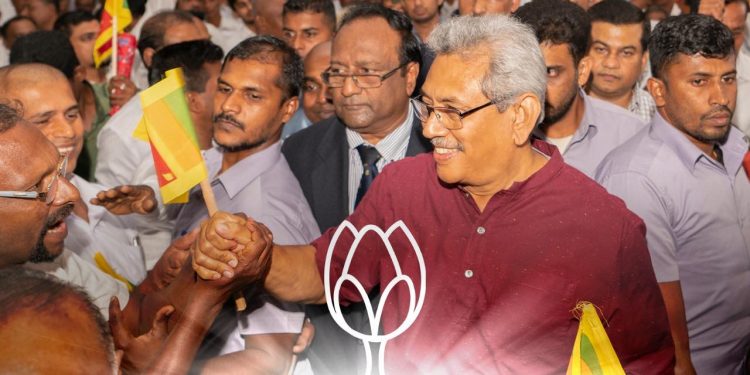Colombo: Sri Lanka’s newly-elected President Gotabaya Rajapaksa delivered a measured speech on Monday at his swearing-in ceremony. He said that his country will maintain friendly ties with all nations and remain neutral in matters involving international powers so as to stay out of conflicts.
The 70-year-old controversial wartime defence secretary’s statement is of importance as Sri Lanka has historically been an important commercial hub along the maritime routes due to its strategic position in the Indian Ocean, where China is increasingly making its inroads, raising concerns in India.
Gotabaya Rajapaksa stormed to victory Sunday, trouncing his nearest rival Sajith Premadasa by a margin of over 13 lakh votes – 52.50 per cent of votes polled against 41.99 per cent.
In his first address to the nation, Rajapaksa spoke on matters such as foreign policy and sustainable development.
On foreign policy, the newly-elected President noted that Sri Lanka will remain friendly with all nations but would remain neutral so as to stay out of conflicts between international powers, Sri Lankan news outlet ‘News First’ reported. He also pledged to support the UN’s sustainable development goals and make Sri Lanka one of the leading countries in this aspect.
President Rajapaksa assured that corruption would not be tolerated under his administration.
Rajapaksa, who ruthlessly ended Sri Lanka’s nearly 30-year civil war with the LTTE, is both respected and reviled in the island nation where he is considered a ‘war hero’ by the Sinhalese Buddhist majority, but mostly distrusted by the minority Tamils.
A former military man, Rajapaksa attended the counter-insurgency and jungle warfare school in Assam in 1980, served as the defence secretary during his elder brother Mahinda Rajapaksa’s tenure as president from 2005 to 2014. Rajapaksa visited India in 2012 and 2013 in his capacity as the defence secretary.
While families of ethnic Tamils killed or disappeared during the civil war accuse Rajapaksa of war crimes, Muslims fear his popularity among Sinhalese Buddhists will further deepen the divide between the two communities post the Easter Sunday attacks carried out by Islamist extremists that claimed 269 lives.
The Hindus and Muslims together constitute approximately 20 per cent of Sri Lanka’s population.
PTI






































